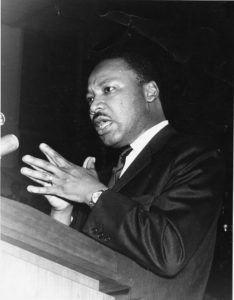 This is Martin Luther King Day, so our thoughts ought to go to the way we treat one another in the one race that is grounded in Biblical truth: the human race. Scripture offers confirmation of that perspective.
This is Martin Luther King Day, so our thoughts ought to go to the way we treat one another in the one race that is grounded in Biblical truth: the human race. Scripture offers confirmation of that perspective.
After the Great Flood in Noah’s day (yes, I’m one of those who see that event as history, not legend or myth), we have a genealogical chapter in Genesis that shows where all of Noah’s descendants dispersed. At the end of that accounting, we are told the following:
These are the families of the sons of Noah, according to their genealogies, by their nations; and out of these the nations were separated on the earth after the flood.
All physical distinctions among mankind developed from this one family. We all have a common ancestor (and I don’t mean what an evolutionist would mean by that). Consequently, any ideology that claims the superiority of one branch of humanity or the inferiority of another is profoundly unbiblical.
In the New Testament book of Acts, we see the apostle Paul speaking on Mars Hill in Athens to a gathering of philosophers (and would-be philosophers). In the midst of his address to them, he makes this comment:
He Himself [God] gives to all people life and breath and all things; and He made from one man every nation of mankind to live on all the face of the earth . . . that they would seek God, if perhaps they might grope for Him and find Him, though He is not far from each one of us; for in Him we live and move and exist.
First, this is a confirmation of the Genesis account as to the origin of mankind. Second, it is a clear affirmation of the doctrine that God wants all men, of whatever ethnic background and no matter what external differences one group may have with another, to be brought into His kingdom.
In his letters, Paul reiterates this doctrine, as in Galatians when he writes,
There is neither Jew nor Greek, there is neither slave nor free man, there is neither male nor female; for you are all one in Christ Jesus. And if you belong to Christ, then you are Abraham’s descendants, heirs according to promise.
Some people might be confused by Paul’s words here. Yes, there is a distinction still between Jews and Gentiles, between those living a life in slavery and those who are free, between men and women. What he’s getting at is simply that all of those distinctions make no difference to God when it comes to our standing before Him. When we come to Christ, we are equally part of His family no matter the external differences.
Paul returns to that theme in the book of Colossians:
Do not lie to one another, since you laid aside the old self with its evil practices, and have put on the new self who is being renewed to a true knowledge according to the image of the One who created him—a renewal in which there is no distinction between Greek and Jew, circumcised and uncircumcised, barbarian, Scythian, slave and freeman, but Christ is all, and in all.
 What’s more important than what we see on the outside of people is what’s going on inside. Our hearts are being changed through Christ; we are being transformed into His image. And our “race” doesn’t matter.
What’s more important than what we see on the outside of people is what’s going on inside. Our hearts are being changed through Christ; we are being transformed into His image. And our “race” doesn’t matter.
In our nation, we look back on a history of slavery and segregation that never should have occurred. We do need a sense of proportion, though: slavery has existed throughout human history.
As a nation, we have taken steps to try to erase that blight in our treatment of our fellow humans. In my opinion, great progress has been made over the years. Others don’t see it that way at all. Unfortunately, some are more interested in hanging on to grievances and fomenting racial animosity—and that occurs on both sides of the divide.
Martin Luther King wanted a complete integration of man’s artificial racial classifications into the one race that has Biblical backing, the race that Jesus Christ died for, the race that includes all men and women regardless of those external differences so many want to emphasize.
We need to advance the Biblical perspective on the human race: we are all the descendants of one family, and we are all made in the image of God. It’s time to begin treating each other accordingly.
